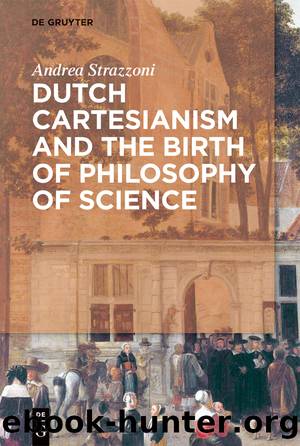Dutch Cartesianism and the Birth of Philosophy of Science by Strazzoni Andrea;

Author:Strazzoni, Andrea;
Language: eng
Format: epub
Publisher: De Gruyter
Published: 2018-07-15T00:00:00+00:00
7.4 A first foundation: The survival axiom
The first formulation of the problem of the foundation of knowledge in natural philosophy as scientia, attained by following Newton’s rules of philosophy, can be found in ’s Gravesande’s De matheseos and in his Praefatio primae editionis. With respect to mathematical statements, according to his De matheseos these are clear, indubitable, concern simple entities, and do not depend on the will of God, since He cannot violate the principle of contradiction (’s Gravesande 1717, pp. 7, 11). Hence, mathematical statements are necessarily true, i.e. are endowed with mathematical evidence. On the other hand, the knowledge of matters of fact has another kind of certainty, which relies on the use of testimony for history and of analogy for physics, allowing mathematical generalisations from the observation of phenomena (’s Gravesande 1717, pp. 11–12). Such certainty is firstly provided with a foundation in ’s Gravesande’s Praefatio primae editionis, where he addresses the legitimacy of the use of Newton’s first three rules in physics, these being:
Regula 1. Causas rerum naturalium non plures admitti debere quam quae et verae sint, et earum phenomenis explicandis sufficient.
Regula 2. Effectuum naturalium eiusdem generis easdem esse causas.
Regula 3. Qualitates corporum quae intendi et remitti nequeunt, quaeque corporibus omnibus competunt in quibus experimenta instituere licet, pro qualitatibus corporum universorum habenda sunt. (’s Gravesande 1720–1721, vol. I, p. 2)
Such rules concern matters of fact, whose existence is contingent, that is, their contrary is still possible (’s Gravesande 1720–1721, Praefatio, p. VII). One can grasp their existence only through the senses: however, God himself provided us with some rules aimed at ensuring the truth of our knowledge of such matters, that is, Newton’s regulae philosophandi (’s Gravesande 1720–1721, vol. I, p. 7). Whereas the first rule, according to ’s Gravesande, is self-justified as it is the expression of a principle of economy, the other two rules require some premises as they determine the use of analogy in reasoning. In any case, ’s Gravesande still does not explicitly provide a foundation of science on divine goodness as he would do in his later works. Instead, he grounds such rules on his well-known survival axiom, “pro vero habendum omne quod si negetur societas inter homines destruitur” (’s Gravesande 1720–1721, vol. I, p. 8). According to him, insofar as society cannot survive if men cease to reason on the basis of sense data and analogy, and given the fact that God himself has put us in the necessity of reasoning by analogy, Newton’s second and third rules are given a foundation.438 Such a foundation is theological since it appeals to the role of God in creating us as beings forced to use analogy. According to ’s Gravesande, this argument leads to the necessary conclusion that reasoning by analogy will not deceive us. On the other hand, the conclusions reached by analogy are not as necessary as their foundation is, as one may fail in any particular reasoning.439 However, ’s Gravesande does not define what kinds of necessity are involved, nor does he appeal to divine goodness to ensure the truth of our statements.
Download
This site does not store any files on its server. We only index and link to content provided by other sites. Please contact the content providers to delete copyright contents if any and email us, we'll remove relevant links or contents immediately.
| Anthropology | Archaeology |
| Philosophy | Politics & Government |
| Social Sciences | Sociology |
| Women's Studies |
The remains of the day by Kazuo Ishiguro(7537)
Tools of Titans by Timothy Ferriss(6929)
The Black Swan by Nassim Nicholas Taleb(6179)
Inner Engineering: A Yogi's Guide to Joy by Sadhguru(5883)
Giovanni's Room by James Baldwin(5868)
The Way of Zen by Alan W. Watts(5785)
The Six Wives Of Henry VIII (WOMEN IN HISTORY) by Fraser Antonia(4784)
The Power of Now: A Guide to Spiritual Enlightenment by Eckhart Tolle(4745)
Astrophysics for People in a Hurry by Neil DeGrasse Tyson(4612)
Asking the Right Questions: A Guide to Critical Thinking by M. Neil Browne & Stuart M. Keeley(4556)
12 Rules for Life by Jordan B. Peterson(3720)
The Ethical Slut by Janet W. Hardy(3489)
Skin in the Game by Nassim Nicholas Taleb(3452)
Housekeeping by Marilynne Robinson(3391)
The Art of Happiness by The Dalai Lama(3374)
Double Down (Diary of a Wimpy Kid Book 11) by Jeff Kinney(3264)
Skin in the Game: Hidden Asymmetries in Daily Life by Nassim Nicholas Taleb(3255)
Walking by Henry David Thoreau(3227)
12 Rules for Life: An Antidote to Chaos by Jordan B. Peterson(3194)
